#the digital public library of america
Text
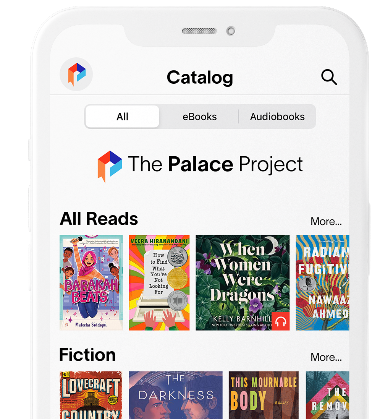
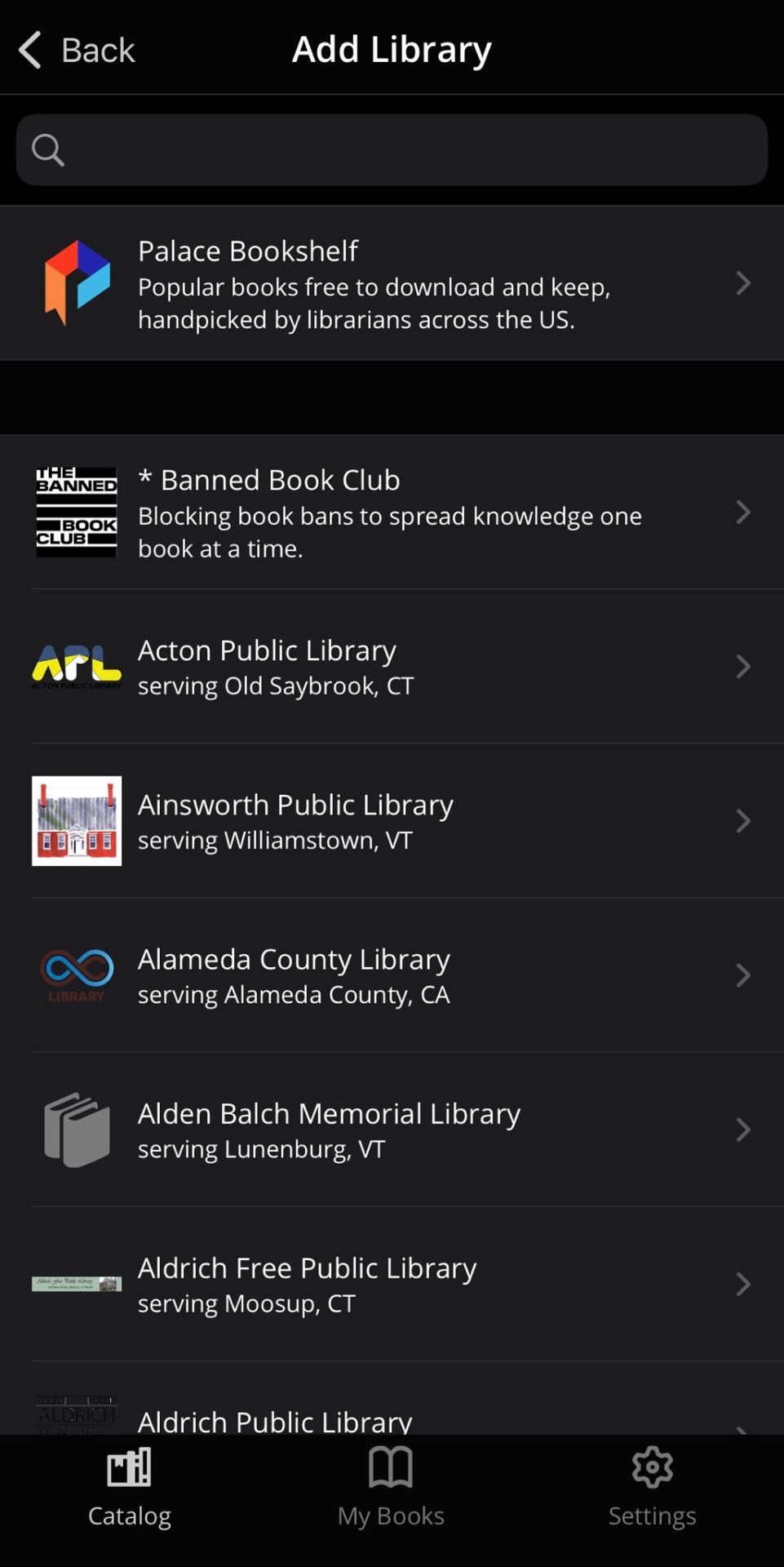





I recently read this article from Smithsonian Magazine where Christopher Parker discussed book bans. The Digital Public Library of America announced the launch of The Banned Book Club, which “makes e-book versions of banned books available to readers in locations across the United States where titles have been banned.” Users can download The Palace Project app and access over 15,000 titles. The Palace Project “supports the mission of public libraries by providing equitable access to digital knowledge,” and it appears that libraries across the country are willing to participate in this cause. I searched for libraries in Kentucky on the app, and I found three: William B. Harlan Memorial Library, Jessamine County Public Library, and Bell County Public Library. I chose to go through the William B. Harlan Memorial Library. I had to create a library card to borrow a book, however, but I could create one even though I am not a resident of that particular county. I selected The Last Cuentista by Donna Barba Higuera, and I could access it immediately as an eBook on my phone. I truly appreciate any initiative that supports access to all books, regardless of any challenges that these titles are up against. I hope to see more libraries in Kentucky on this app as it continues to grow.
#kentuckylibrarian#kentucky#library#librarian#books and reading#library science#library news#the digital public library of america#the banned book club#banned books#book banning#the palace project#library app#ebook#ebooks#digital resources#digital library resources#digital library
33 notes
·
View notes
Text
To get from one side of the U.S. to the other is to criss-cross a veritable snakes and ladders of state and county-level legislation and policy. If you’re after a particular title by Toni Morrison or Margaret Atwood, you might find that it’s available in Georgia, and effectively banned next door in Florida. A new initiative from the Digital Public Library of America (DPLA), launched in concert with the Palace Project, hopes to toss a ladder to people living in places where access is restricted.
The Banned Book Club is a free e-reader app that uses GPS-enabled geotargeting to determine which books are not available in a given area, and upload them to a library. To transcend petty local politics, simply download The Palace app, then select “Banned Books Club” as your “local library.” You will then be able to access all the goodies that someone else has “challenged.”
Executive Director of the DPLA, John Bracken, said in a statement that “book bans are one of the greatest threats to our freedom.” Thus, your local library doing what it can to remedy your rights.
They can’t wrap every state in tin foil, can they!
The project was announced on July 20th, and is doing its work as I type.
#article#books and libraries#books and authors#books and writing#books and reading#books and literature#digital library#libraries#library#banned books#banned book club#books#public library#Digital Public Library of America (DPLA)#DPLA#Digital Public Library of America
127 notes
·
View notes
Photo

Ida B. Wells, Southern Horrors. Lynch Law In All Its Phases, The New York Age Print, 1892 [The New York Public Library, New York, NY. DPLA – Digital Public Library of America]
#graphic design#pamphlet#book#ida b. wells#the new york age print#new york public library#digital public library of america#1890s
17 notes
·
View notes
Text
Give 'Em Books!!! 📖
Something good popped out in my newsfeed today and I just had to share it with you. It is called Digital Public Library of America (DPLA) and it recently launched the Banned Book Program, granting free nationwide access to books restricted in schools or libraries.
It functions through GPS-based geo-targeting; by typing in your zip code, you are shown the complete list of titles prohibited in…

View On WordPress
#Banned Book Program#banned books#Books Unbanned#Brooklyn Public Library#Digital Public Library of America (DPLA)
0 notes
Text
Honored to be featured alongside Brooklyn & other public libraries’ Books Unbanned project, the Digital Public Libraries of America’s Banned Books Club, & Project Gutenberg for helping people access free books 📚 🌈
6K notes
·
View notes
Text
RB Search Gizmos: Get Resources About a Historical Figure with the Contemporary Biography Builder
RB Search Gizmos: Get Resources About a Historical Figure with the Contemporary Biography Builder
The best thing about the Internet is that it’s constantly getting bigger, with more information being added every second.
The worst thing about the Internet is that it’s constantly getting bigger, with more information being added every second.
I was thinking the other day about Web-searching for historical figures. There’s so much research and content coming online now that it seems like older…

View On WordPress
#Chronicling America#Digital Public Library of America#featured#Google Books#history#Internet Archive#wikipedia
0 notes
Text
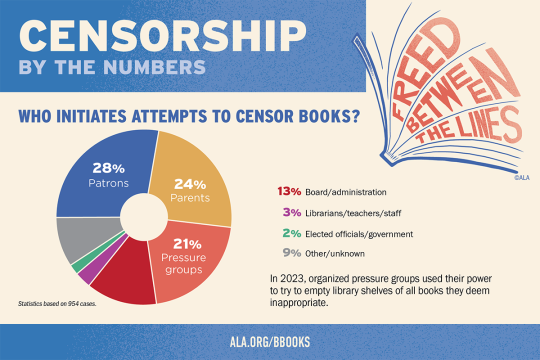


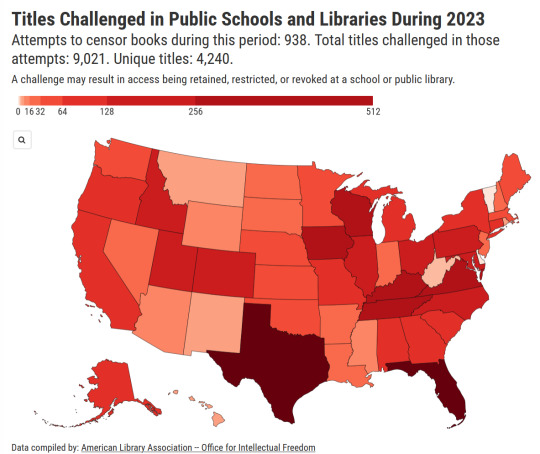
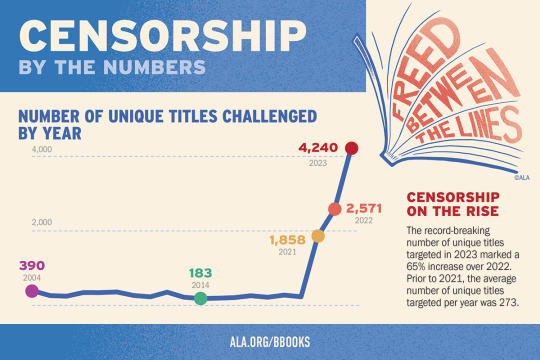
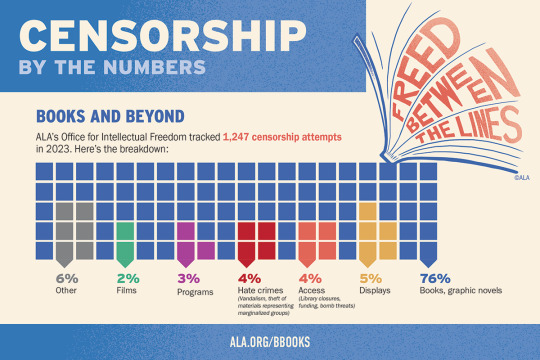
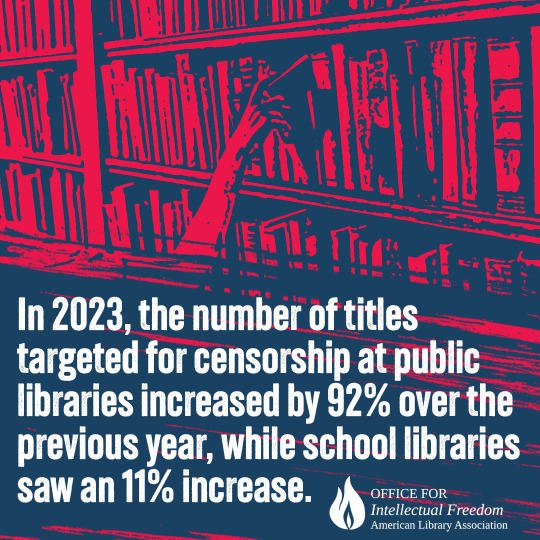
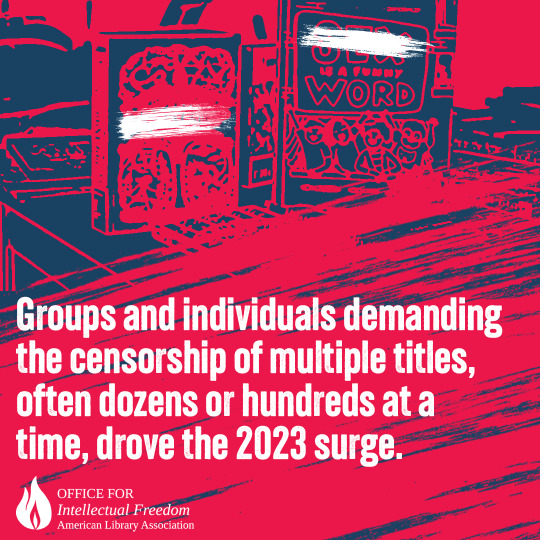
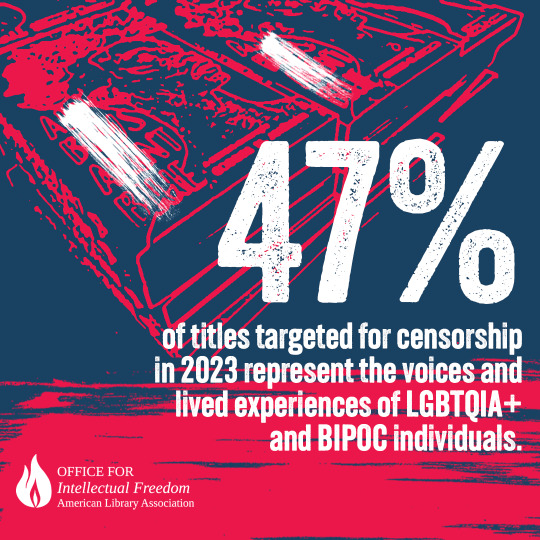
The ALA's State of America's Libraries Report for 2024 is out now.
2023 had the highest number of challenged book titles ever documented by the ALA.
You can view the full PDF of the report here. Book ban/challenge data broken down by state can be found here.
If you can, try to keep an eye on your local libraries, especially school and public libraries. If book/program challenges or attacks on library staff are happening in your area, make your voice heard -- show up at school board meetings, county commissioner meetings, town halls, etc. Counterprotest. Write messages of support on social media or in your local papers. Show support for staff in-person. Tell others about the value of libraries.
Get a library card if you haven't yet -- if you're not a regular user, chances are you might not know what all your library offers. I'm talking video games, makerspaces (3D printers, digital art software, recording equipment, VR, etc.), streaming services, meeting spaces, free demonstrations and programs (often with any necessary materials provided at no cost!), mobile WiFi hotspots, Library of Things collections, database subscriptions, genealogy resources, and so on. A lot of electronic resources like ebooks, databases, and streaming services you can access off-site as long as you have a (again: free!!!) library card. There may even be services like homebound delivery for people who can't physically come to the library.
Also try to stay up to date on pending legislation in your state -- right now there's a ton of proposed legislation that will harm libraries, but there are also bills that aim to protect libraries, librarians, teachers, and intellectual freedom. It's just as important to let your representatives know that you support pro-library/anti-censorship legislation as it is to let them know that you oppose anti-library/pro-censorship legislation.
Unfortunately, someone being a library user or seeing value in the work that libraries do does not guarantee that they will support libraries at the ballot. One of the biggest predictors for whether libraries stay funded is not the quantity or quality of the services, programs, and materials it offers, but voter support. Make sure your representatives and local politicians know your stance and that their actions toward libraries will affect your vote.
Here are some resources for staying updated:
If you're interested in library advocacy and staying up to date with the challenges libraries are facing in the U.S., check out EveryLibrary, which focuses on building voter support for libraries.
Book Riot has regular articles on censorship attempts taking place throughout the nation, which can be found here, as well as a Literary Activism Newsletter.
The American Library Association's Office for Intellectual Freedom focuses on the intellectual freedom component of the Library Bill of Rights, tracks censorship attempts throughout each year, and provides training, support, and education about intellectual freedom to library staff and the public.
The Electronic Frontier Foundation focuses on intellectual freedom in the digital world, including fighting online censorship and illegal surveillance.
I know this post is long, but please spread the word. Libraries need your support now more than ever.
107 notes
·
View notes
Text
Big Train managers earn bonuses for greenlighting unsafe cars

Tomorrow (November 16) I'll be in Stratford, Ontario, appearing onstage with Vass Bednar as part of the CBC IDEAS Festival. I'm also doing an afternoon session for middle-schoolers at the Stratford Public Library.

Almost no one knows this, but last June, a 90-car train got away from its crew in Hernando, MS, rolling three miles through two public crossings, a ghost train that included 47 potentially explosive propane cars. The "bomb train" neither crashed nor derailed, which meant that Grenada Railroad/Gulf & Atantic didn't have to report it.
This is just one of many terrifying near-misses that are increasingly common in America's hyper-concentrated, private equity-dominated rail sector, where unsafe practices dominate and whistleblowers face brutal retaliation for coming forward to regulators.
These unsafe practices – and the corporate policies that deliberately gave rise to them – are documented in terrifying, eye-watering detail in a deeply reported Propublica story by Topher Sanders, Jessica Lussenhop,Dan Schwartz, Danelle Morton and Gabriel L Sandoval:
https://www.propublica.org/article/railroad-safety-union-pacific-csx-bnsf-trains-freight
It's a tale of depraved indifference to public safety, backstopped by worker intimidation. The reporting is centered on railyard maintenance inspectors, who are charged with writing up "bad orders" to prevent unsafe railcars from shipping out. As private equity firms consolidated rail into an ever-dwindling number of companies, these workers face supervisors who are increasingly hostile to these bad orders.
It got so alarming that some staffers started carrying hidden digital recorders, so they could capture audio of their bosses illegally ordering them to greenlight railcars that were too unsafe for use. The article features direct – and alarming – quotes, like supervisor Andrew Letcher, boss of the maintenance crews at Union Pacific's Kansas City yard saying, "If I was an inspector on a train I would probably let some of that nitpicky shit go."
Letcher – and fellow managers for other Tier 1 railroads quoted in the piece – aren't innately hostile to public safety. They are quite frank about why they want inspectors to "let that nitpicky shit go." As Letcher explains, "The first thing that I’m getting questioned about right now, every day, is why we’re over 200 bad orders and what we’re doing to get them down."
In other words, corporate rail owners have ordered their supervisors to reduce the amount of maintenance outages on the rail lines, but have not given them additional preventative maintenance budgets or crew. These supervisors warn their employees that high numbers of bad orders could cost them their jobs, even lead to the shutdown of the car shops where inspectors are prone to pulling dangerous cars out of service.
It's a ruthless form of winnowing. Gresham's Law holds that "bad money drives out good" – in an economy where counterfeit money circulates, people preferentially spend their fake money to get it out of their hands, until all the money in circulation is funny money. This is the rail safety equivalent: simply fire everyone who reports unsafe conditions and all your railcars will be deemed safe, with the worst railcars shipped out first. A market for lemons – except these aren't balky used sedans, they're unsafe railcars full of toxic chemicals or explosive propane.
When cataclysmic rail disasters occur – like this year's East Palestine derailment – the rail industry reassures us that this is an isolated incident, pointing to the system's excellent overall safety record. But that record is a mirage, because the near-misses don't have to be reported. Those near-misses are coming more frequently, as the culture of profit over safety incurs a mounting maintenance debt, filling America's rails with potential "bomb cars."
Rail mergers and other forms of deregulated, anything-goes capitalism are justified by conservative economists who insist that "incentives matter," and that the profit motive provides the incentive to improve efficiency, leading to lower costs and better service. But the incentive to externalize risk, kick the can down the road, and capture regulators rarely concerns the "incentives matter" crowd.
Here's an incentive that matters. Rail managers' bonuses – as much as a fifth of their take home pay – are only paid if the trains they oversee run on time. Inspectors have recorded their managers admitting that they have quotas – a maximum number of bad orders their facility may produce, irrespective of how much unsafe rolling stock passes through the facility.
Inspectors have caught their managers removing repair order tags from cars they've flagged as unsafe. Inspectors will log orders in a database, only to have the record mysteriously deleted, or marked as serviced when no service has occurred. Some inspectors have seen the same cars in their yard with the same problems, and repeatedly flagged them without any maintenance being performed before they're shipped out again.
Former managers from Union Pacific, CSX and Norfolk Southern told Propublica that they operated in an environment where safety reports were discouraged, and that workers who filed these reports were viewed as "complainers." Workers furnished Propublica with recordings of rail managers berating them for reporting persistent unsafe conditions the Federal Railroad Administration. Other workers from BNSF said that they believed that their bosses were told when they called the company's "confidential" work-safety tipline, setting them up for retaliation by bosses who'd falsified safety reports.
Whistleblowers who seek justice at OSHA are stymied by long delays, and while switching their cases to court can win them cash settlements, these do not get recorded on the company's safety record, which allows the company to go on claiming to be a paragon of safety and prudence.
The culture of retaliation is pervasive, which explains how the 47-cars worth of propane on the "bomb train" that rolled unattended over three miles of track never made the news. There is a voluntary Close Call Reporting System (operated by NASA!) where rail companies can report these disasters. Not one of America's Class 1 rail companies participate in it.
After the East Palestine disaster, Transport Secretary Pete Buttigieg pushed the rail companies to join, but a year later, none have. It's part of an overall pattern with Secretary Buttigieg, who has prodigious, far-reaching powers under USC40 Section 41712(a), which allow him to punish companies for "unfair and deceptive" practices or "unfair methods of competition":
https://pluralistic.net/2023/01/10/the-courage-to-govern/#whos-in-charge
Buttigieg can't simply hand down orders under 41712(a) – to wield this power, he must follow administrative procedures, conducting market studies, seeking comment, and proposing a rule. Other members of the Biden administration with similar powers, like FTC chair Lina Khan, arrived in office with a ranked-priority list of bad corporate conduct and immediately set about teeing up rules to give relief to the American public.
By contrast, Buttigieg's agency has done precious little to establish the evidentiary record to punish the worst American companies under its remit. His most-touted achievement was to fine five airlines for saving money by cancelling their flights and stranding their passengers. But of the five airlines affected by Buttigieg's order, four were not US companies. The sole affected US carrier was Spirit airlines, with 2% of the market. The Big Four US airlines – who have a much worse record than the ones that were fined – were not affected at all:
https://prospect.org/infrastructure/transportation/ftc-noncompete-airline-flight-cancellation-buttigieg/
Rather than directly regulating the US transportation sector, Buttigieg prefers exacting nonbinding promises from them (like the Tier 1 rail companies' broken promise to sign up to the Close Call Reporting System). Under his leadership, the Federal Railroad Agency has proposed weakening rail safety standards, rescinding an order to improve the braking systems on undermaintained, mile-long trains carrying potentially deadly freight:
https://pluralistic.net/2023/02/11/dinah-wont-you-blow/#ecp
The US transportation system is accumulating a terrifying safety debt, behind a veil of corporate secrecy. It badly demands direct regulation and close oversight.
If you are interested in rail safety, I strongly recommend this episode of Well There's Your Problem, "a podcast about engineering disasters, with slides" – you will laugh your head off and then never sleep again:
https://www.youtube.com/watch?v=0BMQTdYXaH8

If you'd like an essay-formatted version of this post to read or share, here's a link to it on pluralistic.net, my surveillance-free, ad-free, tracker-free blog:
https://pluralistic.net/2023/11/15/safety-third/#all-the-livelong-day
#pluralistic#safety third#safety#whistleblowers#trains#railroad#rail safety#propublica#east palestine#monopoly#osha#bnsf#csx#bad orders#federal railroad administration#fra#association of american railroads#norfolk southern#union pacific#incentives matter#bomb train#Confidential Close Call Reporting System
158 notes
·
View notes
Text
this past week (october 1-7) was banned books week. last year, censors targeted a record 2,571 unique titles, a 38% increase from the 1,858 unique titles targeted for censorship in 2021. the majority of these titles were written by or about members of the LGBT community, Black people, Indigenous people, and other people of color.
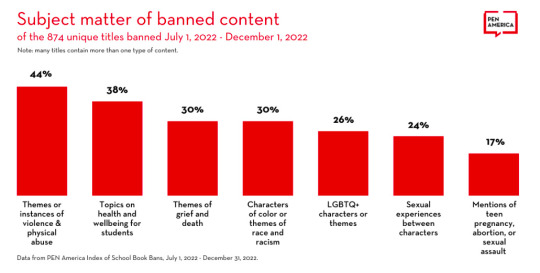
[source]
recently, back in July, we saw Mississippi ban Hoopla & Overdrive for people under the age of 18, restricting young people's right to read and their access to library resources. this is likely going to continue as more parents lobby for "parent's rights" (aka the right to treat their children as property) and pressure school boards to remove certain books from the education system.
but there are people that are pushing back against these restrictions: Leah Johnson, author of You Should See Me in a Crown, has spoken out vocally against book banning as well as her experiences as a Black queer woman. she's also opened her own bookstore, Loudmouth Books in Indianapolis, which will be a haven and spotlight for marginalized voices and controversial literature.
George Johnson, author of All Boys Aren't Blue, has joined the PEN America vs. Escambia County School District to challenge the removal and restrictions of books from school libraries within Escambia County, Florida.
There are also multiple library systems across the country that have joined the Books Unbanned program, which offers free digital library cards to anyone age 13-21.
Brooklyn Public Library: ages 13-21, anywhere in the U.S.
Seattle Public Library: ages 13-26, anywhere in the U.S.
Los Angeles County Public Library: ages 13-18, California only
Boston Public Library: ages 13-26, anywhere in the U.S.
[source]
a lot of these book bans claim to be for the "safety" of children, but that is simply not true. these book bans target LGBT literature and Black literature indiscriminately. this does not protect children, it endangers the most vulnerable of them.
Gender Queer, by Maia Kobabe, was the top banned book in 2022. You can find the author here, where e reflects extensively about the current book bannings & advocates for children's right to read as well as the rights of other banned book authors.
Some of the other most banned books of this past year also include (in no particular order):
The Bluest Eye by Toni Morrison
This Book Is Gay by Juno Dawson
The Hate U Give by Angie Thomas
The Perks of Being a Wallflower by Stephen Chbosky
Sold by Patricia McCormick
Maus: A Survivor's Tale by Art Spiegelman
Lawn Boy by Jonathan Evison
Melissa by Alex Gino
To Kill a Mockingbird by Harper Lee
Push by Sapphire
at the end of this banned books week, we should continue the conversation and support for marginalized authors and diverse literature, especially for children, in schools & libraries. get involved at your own local library, talk to your children or your siblings or your nieces and nephews, attend their school board meetings, and contact your representatives and speak out against book censorship.
89 notes
·
View notes
Note
what do the words "teufel hunden" mean? I saw them as a sticker in the fraktur font on the side of a truck with tons of conservative, gun-worshiping, and veteran bumper stickers. also does the license plate QAI3M mean anything?
not seeing anything more fashy than that
28 notes
·
View notes
Text
Hey folks, just dropping some resources here for those of you who, like me, are always on the hunt for free reading material, whether it's for research or just to satisfy your curiosity. If you're always looking to expand your reading list without breaking the bank, check these out:
Library of Congress: Absolute goldmine for academic researches and historical documents. You can spend hours diving into their collections.
Z-library: A treasure trove of books, articles, and papers on pretty much any topic you can think of. Quick downloads, no fuss.
Project Gutenberg: Free e-books galore, especially if you're into classics. Saved me from many a boring commute.
Internet Archive: A digital library offering free universal access to books, movies, and music, plus archived web pages. Endless hours of browsing joy.
Google Books: Sometimes you just need a quick peek inside a book without committing to buying it. Google Books has got your back.
Google Scholar: It scours through scholarly sources, journals, theses, and more. Just be ready to sift through some dense material.
JSTOR: Another heavyweight in the academic world. JSTOR is packed with scholarly articles, books, and primary sources across various disciplines. Some stuff may be behind a paywall, but there's still plenty to explore for free.
Newspaper Archive: Want to browse through historical newspapers? This site has a massive collection spanning centuries and covering a wide range of topics. Perfect for digging up primary sources.
Newspapers.com: Need more historical newspapers? Look no further.
Perseus Digital Library: Focuses on ancient Greco-Roman materials, perfect for those deep dives into classical history.
Digital Public Library of America: Another treasure trove of digitized materials, including photos, manuscripts, and more.
Europeana: European cultural heritage online. Images, texts, the whole shebang.
DOAJ: Open access journals. DOAJ indexes and provides access to high-quality, peer-reviewed open access research journals.
Open Library: Another digital library offering over 1.7 million free eBooks.
Librivox: Audiobooks for when your eyes need a break.
National Archives (UK): Offers access to a wealth of historical documents, including government records, maps, photographs, and more.
Sci-Hub: For the rebels. Access to scholarly articles.
Directory of Open Access Books (DOAB): Looking for free scholarly books? DOAB has got you covered with a vast collection.
Digital Commons Network: Free, full-text scholarly articles from hundreds of universities and colleges worldwide.
Directory of Open Access Repositories (OpenDOAR): Find open access repositories worldwide.
Gallica (Bibliothèque nationale de France): French flair for your research.
DigitalNZ: Your gateway to New Zealand's digital heritage.
#college life#study#resources#history nerd#anthropology#online learning#academic life#ResearchResources#DigitalArchives#free books#free#digital#archives#libraries#academic#research#books
53 notes
·
View notes
Note
My take on the book pirating discourse, as someone who regularly pirates books:
100% of the books I own I buy used. I never buy a new book, so none of my money is going to an author/publisher anyway. I also don’t really consider a digital file as “real” property anyway. I’ll pirate a book/song/movie and if I like it an awful lot I’ll purchase a physical copy (usually used). If I like a book I’ll also leave reviews and do word-of-mouth advertising, which I feel like should mean something. Now, I don’t necessarily read indie or contemporary fiction in general, and it’s mostly academic stuff, so if I did buy it new it’s probably not going to the author anyway (because they’re dead or it’s an academic publication).
I work in circulation for a library. If anything, this has made me even more pro-piracy. We’re a relatively well-funded library, but there are plenty of communities across America and the world who are underserved. Even one of our constituent townships recently cut funding, which is a trend I’m seeing a lot across America. You can pirate books and still support your local library, if you have one. I mean, we don’t have everything and we can’t have everything. Anyway people can access information and get educated is fine by me. I definitely see book piracy becoming more popular with Gen Z because of how ridiculous textbook prices are, and I 100% support them.
--
Yeah, there's a pretty big range from "I genuinely can't afford this academic book I need! Brill is the devil!" to people with plenty of money refusing to wait for a library copy of some new bestseller but also refusing to buy it. We know it actually does harm the chances of that author getting another book deal, not just their paycheck for this book.
72 notes
·
View notes
Text
40 notes
·
View notes
Note
Hello. I just learned about this thing a bit ago, and got my library card today, and I was wondering if you knew of any other similar libraries that operate primarily through Libby? Now that I have had my eyes open to the possibility of multiple library cards my brain just wants to collect all that I can get.
hi! hmm which are primarily digital libraries through Libby… honestly, no. That’s one of the reasons we decided we’d be able to move forward with QLL after we had the idea, as it was filling a gap that no one else was.
Of course there are some public libraries (brooklyn among others) that have opened up *part* of their Libby catalogues nationally for certain age ranges (13-26), and then there are other digital branches of physical libraries like the Library of Congress’ open access digital collections. The closest I can think of for a fully digital library would be the Digital Public Library of America or DPLA, but they don’t use Libby. BPL, LoC, DPLA and others also don’t have the same focus on queer books that we do at QLL.
There are other excellent queer libraries out there too, but most are primarily physical collections (one exception being Quatrefoil Library who also launched a digital branch on Libby, but they also have a much more geographically narrow focus - Minneapolis - than we do)
#asks#libby#I’d google ‘free non-resident library card’ or something along that line as well#we’ve also reblogged a few posts that list some of these out#but by and large they’re local public libraries that also have digital branches not just digital libraries#still#you should be able to find a few out there!
49 notes
·
View notes
Text

Memorial Day
On this 2023 Memorial Day we present a Civil War-era uniform designed in watercolor by Milwaukee Handicraft Project (MHP) costume designer Mary Holan and scanned for our digital collection Wisconsin Arts Projects of the WPA from volume 1 “Period - Men” of our Costume Design portfolios, which were produced between 1935 and 1939 by artists working with the Federal Theatre Project. These original costume designs were created by MHP's costume design group for use by local theater and school groups. The designation "School Board" written in pencil at the top of the image seems to bear this out.
Also written on the front is "Infantry Overcoat Union Army." Because of its color, it looks more Confederate to us. On the back of the plate is written "Pageant of America v7," which we believe refers to volume seven, "In defense of liberty," from the 15-volume pictorial history of the development of the United States, The Pageant of America: A Pictorial History of the United States, edited by Ralph Henry Gabriel and published by Yale University Press from 1925 to 1929. We checked the digitized collection of The Pageant of America at The New York Public Library, but could not find the source. So, we will take the Union designation at face value to represent U.S. fallen service members on this Memorial Day.
The MHP was founded in 1935 by Harriet Clinton, head of the Women’s Division of Wisconsin’s WPA to help unskilled women laborers provide income for their families. Clinton hired Elsa Ulbricht, an art professor at the Milwaukee State Teacher’s College (one of UWM’s predecessor institutions), to direct the project. The MHP hired around 5,000 people in total throughout its highly successful seven-year existence. Read More about the Project.
The Wisconsin Arts Projects of the WPA digital collection was made possible with generous financial support from The Chipstone Foundation.
View more posts from the Milwaukee Handicraft Project.
View posts from Memorial Days past.
#Memorial Day#holidays#civil war history#civil war#uniforms#costume design#Milwaukee Handicraft Project#MHP#WPA#works progress administration#Wisconsin Arts Projects of the WPA#Mary Holan#Federal Theatre Project#civil war uniform
29 notes
·
View notes
Text

The 1921 destruction in Tulsa wasn't the first or the last race massacre that leveled homes, usurped land or destroyed livelihoods for Black Americans.
One of the first was in 1863 – sparked by a draft law. One of the last happened in 1923 in Rosewood, Florida. Whatever the precipitating event, the desire was generally the same: to destroy Black upward mobility.
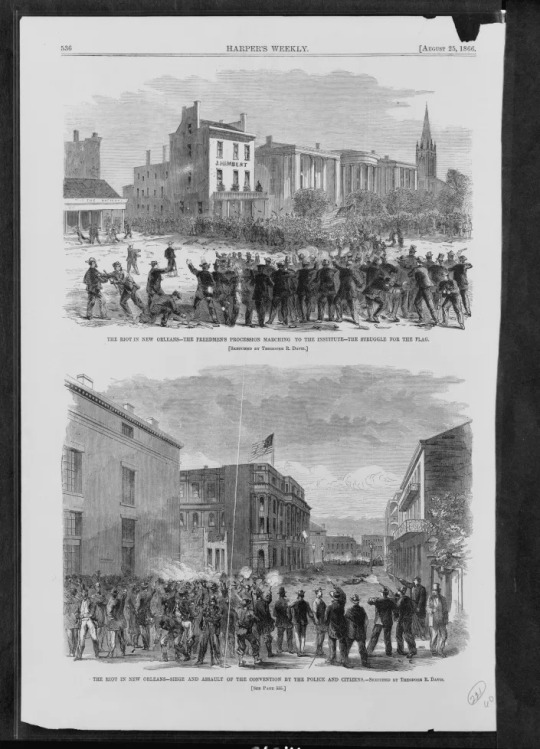
Below, is a database of recorded massacres (defined for the purposes of this project as one or more mob attacks on a Black community that resulted in the aggregate loss of lives, homes, land and livelihoods).
The attacks frequently drove residents away from a community for good. In other instances, Black residents hid in swamps and woods for days to escape death. Others tried to rebuild their town's former glory, but failed with little to no assistance from the surrounding community or government.
One of the most frequently used justifications for an attack? The rumor that an African American male had assaulted a white female. Usually the rumor was unfounded. Frequently it was sparked by an erroneous news report.
This list is by no means, complete. Attacks were frequently denied and not documented by authorities. This is a living, breathing document culled from numerous news reports, historical sites and encyclopedias among other online resources.
I also reached out to every city listed in this database to find out whether reparative actions are currently being taken (of any kind), and if the city's history includes reparations of any sort. The information that I received, along with other information found through searches, is included under the "Reparations history" section.
When more information becomes available, it will be added.
In rare instances, the aftermath of a massacre, and the help given, was meticulously documented. White merchants in New York, for example, raised $40,000 for Black victims of the 1863 attack. The committee's notes were archived in the Library of Congress, and made available through the HathiTrust Digital Library. See them here.
Keeping the public informed about this nation's too frequently ignored history of massacres also depends on you.
Is your family or community history missing from this list? Send us your story along with documentation. Reach me at [email protected].
This article originally appeared on USA TODAY: Nearly two dozen massacres in US history. Reparations? Rarely.
#Nearly two dozen Black massacres in American history. Reparations? Rarely.#reparations#white hate#white supremacy#Black Towns#Black people massacred by white mobs
31 notes
·
View notes